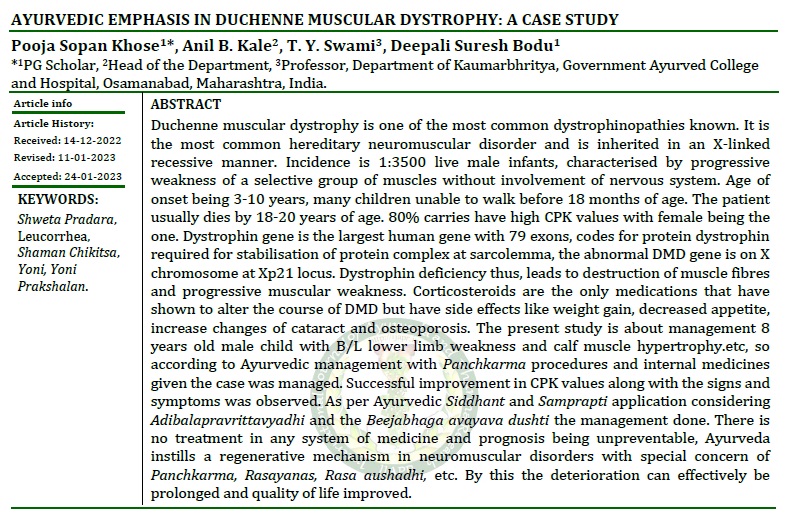Ayurvedic Emphasis in Duchenne Muscular Dystrophy: A Case Study
DOI:
https://doi.org/10.47070/ijapr.v11i1.2665Keywords:
Duchenne muscular dystrophy, Cpk, Adibalapravritta, Beejabhaga avayava dushti, Panchkarma.Abstract
Duchenne muscular dystrophy is one of the most common dystrophinopathies known. It is the most common hereditary neuromuscular disorder and is inherited in an X-linked recessive manner. Incidence is 1:3500 live male infants, characterised by progressive weakness of a selective group of muscles without involvement of nervous system. Age of onset being 3-10 years, many children unable to walk before 18 months of age. The patient usually dies by 18-20 years of age. 80% carries have high CPK values with female being the one. Dystrophin gene is the largest human gene with 79 exons, codes for protein dystrophin required for stabilisation of protein complex at sarcolemma, the abnormal DMD gene is on X chromosome at Xp21 locus. Dystrophin deficiency thus, leads to destruction of muscle fibres and progressive muscular weakness. Corticosteroids are the only medications that have shown to alter the course of DMD but have side effects like weight gain, decreased appetite, increase changes of cataract and osteoporosis. The present study is about management 8 years old male child with B/L lower limb weakness and calf muscle hypertrophy.etc, so according to Ayurvedic management with Panchkarma procedures and internal medicines given the case was managed. Successful improvement in CPK values along with the signs and symptoms was observed. As per Ayurvedic Siddhant and Samprapti application considering Adibalapravrittavyadhi and the Beejabhaga avayava dushti the management done. There is no treatment in any system of medicine and prognosis being unpreventable, Ayurveda instills a regenerative mechanism in neuromuscular disorders with special concern of Panchkarma, Rasayanas, Rasa aushadhi, etc. By this the deterioration can effectively be prolonged and quality of life improved.
Downloads




